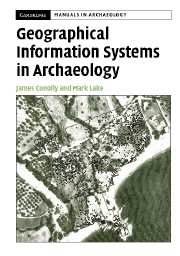Book contents
- Frontmatter
- Contents
- List of figures
- List of tables
- List of boxes
- Acknowledgements
- 1 INTRODUCTION AND THEORETICAL ISSUES IN ARCHAEOLOGICAL GIS
- 2 FIRST PRINCIPLES
- 3 PUTTING GIS TO WORK IN ARCHAEOLOGY
- 4 THE GEODATABASE
- 5 SPATIAL DATA ACQUISITION
- 6 BUILDING SURFACE MODELS
- 7 EXPLORATORY DATA ANALYSIS
- 8 SPATIAL ANALYSIS
- 9 MAP ALGEBRA, SURFACE DERIVATIVES AND SPATIAL PROCESSES
- 10 REGIONS: TERRITORIES, CATCHMENTS AND VIEWSHEDS
- 11 ROUTES: NETWORKS, COST PATHS AND HYDROLOGY
- 12 MAPS AND DIGITAL CARTOGRAPHY
- 13 MAINTAINING SPATIAL DATA
- Glossary
- References
- Index
7 - EXPLORATORY DATA ANALYSIS
Published online by Cambridge University Press: 05 June 2012
- Frontmatter
- Contents
- List of figures
- List of tables
- List of boxes
- Acknowledgements
- 1 INTRODUCTION AND THEORETICAL ISSUES IN ARCHAEOLOGICAL GIS
- 2 FIRST PRINCIPLES
- 3 PUTTING GIS TO WORK IN ARCHAEOLOGY
- 4 THE GEODATABASE
- 5 SPATIAL DATA ACQUISITION
- 6 BUILDING SURFACE MODELS
- 7 EXPLORATORY DATA ANALYSIS
- 8 SPATIAL ANALYSIS
- 9 MAP ALGEBRA, SURFACE DERIVATIVES AND SPATIAL PROCESSES
- 10 REGIONS: TERRITORIES, CATCHMENTS AND VIEWSHEDS
- 11 ROUTES: NETWORKS, COST PATHS AND HYDROLOGY
- 12 MAPS AND DIGITAL CARTOGRAPHY
- 13 MAINTAINING SPATIAL DATA
- Glossary
- References
- Index
Summary
Introduction
Selecting and classifying geospatial data on the basis of their location and attributes starts the process of data exploration, pattern recognition and the interpretation of spatial data. The first part of this chapter examines queries as part of the analytical process in GIS. A query is a formal request for a subset of data based on one or more selection criteria and forms a core function of GIS. The second part of this chapter then considers the subject of classification, which refers to the grouping or placing of data into categories on the basis of shared qualitative or quantitative characteristics. This chapter also discusses methods for the classification of multispectral satellite image data, which is an important process in the interpretation of remotely sensed imagery.
The query
There are three types of query performed in GIS: (i) phenomenal or attribute queries, which question the related non-spatial data tables of spatial objects (e.g. ‘select all sites that have obsidian artefacts’); (ii) topological queries, which question the geometric configuration of an object or relationship between objects (e.g. ‘select all sites within Smith County’); (iii) distance queries, which ask something about the spatial location of objects (e.g. ‘select all sites within 100 km of an obsidian source’).
In Chapter 4 the concept of the relational model was introduced for managing both attribute and spatial datasets. This is the most commonly encountered data structure in GIS.
- Type
- Chapter
- Information
- Geographical Information Systems in Archaeology , pp. 112 - 148Publisher: Cambridge University PressPrint publication year: 2006
- 1
- Cited by



